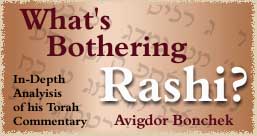

Back to this week's parsha | Previous Issues
ParashasVa’eira
See how Rashi is concerned with minor, what we might even consider, insignificant, problems in understanding the text. Exodus 6:4 I also established My covenant with them, to give them the land of Canaan, the land of their sojourning, were they sojourned. I have also established My covenant etc. Rashi: And also when I appeared to them as El Shaddai I institued and set up my covenant between Myself and them. What can you ask here? Your Question:
Questioning Rashi A Question: What is Rashi doing here? He seems to be saying what the Torah itself already said. Why belabor the obvious? What is bothering him? Your Answer:
What Is Bothering Rashi? An Answer: The word “ also” is problematic here. “Also” usually connects two positive or two negative statements, it cannot connect a negative satement with a positive one. For example one could say “I went to the store and bought bread and also bought milk.” But one wouldn’t say “ I went to the store and bought bread and also didn’t by any milk. ” Likewise, our verse follows the previous verse where it says negatively “And by My name, Hashem, I was not known to them.” To continue with the positive statement “and also I established etc.” doesn’t make sense. This is bothering Rashi. How does Rashi’s comment deal with this problem? Your Answer:
Understanding Rashi An Answer: Rashi’s comment connects the positive statement in our verse ,“I established My covenant...”, with the positive statement at the beginning of the previous verse, “And I appeared to Abraham ... as El Shaddai, ” skipping over the latter part of the verse and its negative connotation. We see now the significance of Rashi’s first words here, “When I appeared unto them ...” This throws us back to the beginning of the previous verse. A Closer Look Notice some other slight change Rashi makes here. He substitutes other words for one of the words in the Torah. Which words? Your Answer:
Answer: The Torah uses the word “V’hakimosi” meaning “I have established”. Rashi uses two other words “Hitzavti” and “He’emadiiti..” Meaning “I institued and set up.” Why does he make this change? This is a bit more difficult. Hint: See Genesis 26:3. Your Answer:
An Answer: In Genesis, in another context, when G-d speaks with Isaac, He uses the same word “V’hakimosi.” There it says: “Dwell in this land and I will be with you and will bless you; for to you and to your offspring will I give all these countries and I will fullfil (“V’hakimosi”) My oath which I swore to Abraham your father.” Here, in this context, the word ”V’hakimosi” means “I will fulfill” whereas in our verse it can’t mean “will fullfil”, because the verb is in the past tense and G-d had not yet fullfilled His promise. Therefore in place of “I fulfilled” Rashi substitutes the words “I set up” “I institued.” Rashi is thus telling us that this word can have other meanings besides “I fullfilled,” and thereby avoids a possible misunderstanding. A Lesson The above analysis shows how we must understand the purpose of each word in Rashi’s comments in order to derive maximum benefit from his precisly worded commentary. End. Back to this week's parsha | Previous Issues
|